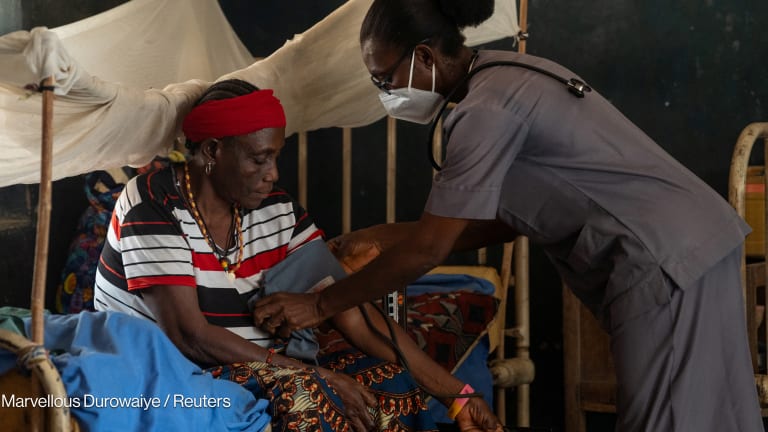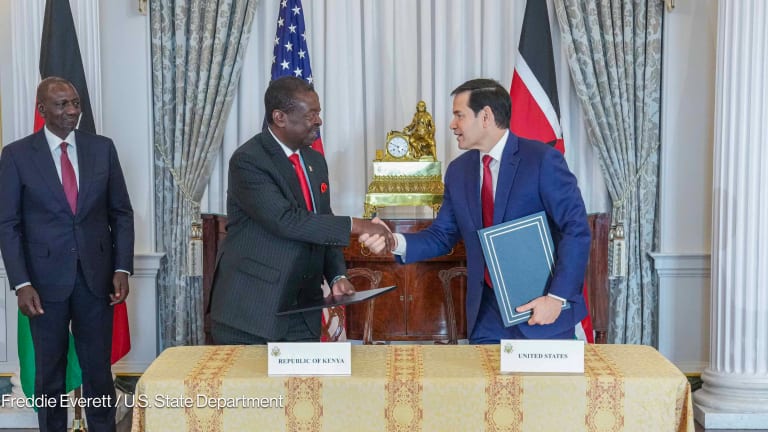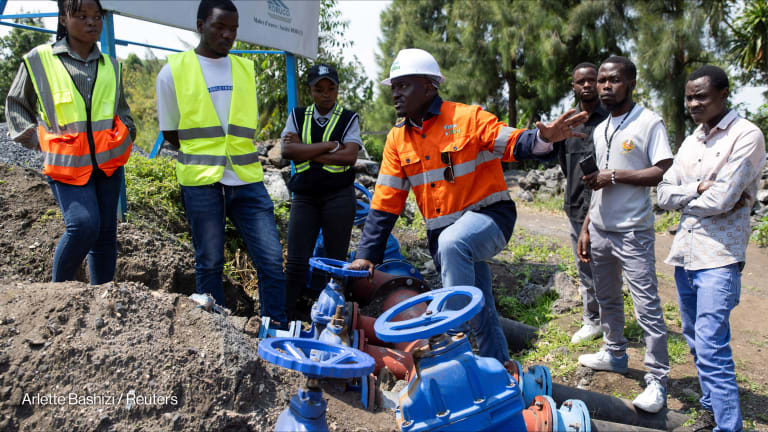USAID-Angola Partnership
From fiscal 2014 to 2018, U.S aid to Angola will focus on the health sector. But support will mainly be in the form of technical assistance to government institutions rather than grants and contracts to NGOs and contractors.
Angolan mother and her children. USAID is focusing its health interventions in Angola on ending preventable child and maternal death, and achieving an AIDS-free generation. Photo by: USAID The second-largest petroleum producer in Africa and the fourth-largest producer of diamonds in the world, Angola is an emerging international market. But its economic growth has not translated to the promotion of human development. Angola’s health situation is among the worst in the world. Mortality rate of children under 5 is at 98 per 1,000, while maternal mortality is at 450 deaths per 100,000 live births. There is also a high prevalence of malaria, the main cause of illness and death in the country. These conditions seem to indicate that Angola is unlikely to meet the Millennium Development Goals of reducing child mortality, improving maternal health and combating malaria by 2015. The lack of infrastructure and severe shortage of health professionals only complicate this already dire picture. The World Health Organization estimates that there are only 1.7 doctors and 16.6 nurses and midwives for every 10,000 Angolans. The Angolan government’s 2013-2017 National Development Plan focuses on economic and social development. In the health sector, the main objective is to reduce the mortality rates of mothers and children under 5. Other priorities include addressing malaria, HIV, AIDS and other deadly diseases; promoting family planning; and improving the quality and efficiency of health service delivery. Due to these challenges, U.S. Agency for International Development interventions in the country are centered on the health sector. But in its development cooperation strategy with Angola for 2014-2018, USAID made clear support will mainly be in the form of technical assistance to government institutions rather than grants and contracts to international nongovernmental organizations and contractors. The five-year strategy also prioritizes building and strengthening the capacity of government institutions, encouraging local NGOs and the private sector to become more involved in the country’s development, and promoting public-private partnerships. And, in line with USAID Forward reforms, local solutions to addressing Angola’s development challenges are emphasized as well. Funding levels Since 2010, the United States has provided $374 million in development assistance to Angola. For fiscal years 2014 and 2015, the United States has requested $56 million and $57 million in development assistance to the African country, respectively. Below is a breakdown of actual and requested funding since 2010. Funding priorities USAID set out two overarching goals in its current development cooperation strategy with Angola: 1. Improve the health status and well-being of the population. 2. Strengthen the government’s responsiveness to its citizens’ needs. The bulk of the funding has been appropriated to the health sector, receiving 88 percent and 90 percent from the 2014 and 2015 budgets, respectively. In line with Angola’s development plan, USAID intends to veer away from disease-specific programs in favor of a more comprehensive strengthening of health services. Under the first objective, USAID is focusing on ending preventable child and maternal death, and achieving an AIDS-free generation. Women and girls are often at a disadvantage in accessing health care resources and services and will therefore be targeted for health-related programming. USAID interventions under this objective include: - Building sustainable platforms for the supply and demand of health services in priority areas. - Modernizing public administration through targeted technical assistance. The second objective, on the other hand, intends to promote accountable, transparent and responsive governance. This will be done through a health lens and through the health sector. USAID will continue to provide support to the government through technical assistance, supervision, training and capacity-building initiatives. The main activities under this objective are: - Strengthening public financial management. - Enhancing mechanism for public participation. Shown below are USAID disbursements per sector from 2010 to 2015: The U.S. government also supports security reforms and promotes stabilization. For fiscal 2014 and 2015, the United States will provide $760,000 to fund military professionalization through the International Military Education and Training Program and $11.3 million to support humanitarian mine action efforts. Devex analysis The United States is the largest aid donor in Angola. U.S. appropriations to the African country, however, have been declining since 2011 — a trend that is likely to continue in the years ahead. By the end of this development strategy period, the Angolan government is expected to be fully capable of designing and implementing its own development programs with only minimal support from USAID. Now that Angola has the capacity fund its own development programs, USAID will lend its technical expertise in designing policies and in the planning and implementation of programs — marking the United States’ transition from being a donor to becoming a development partner. Further, USAID recognizes the important role of the private sector and the civil society in Angola. The agency is extending its efforts to encourage them and the government to work together in solving the country’s problems. At the same time, USAID is intensifying its public-private partnership strategy to combine the strengths of all the stakeholders. The United States also considers Angola a key partner in promoting peace, stability and economic growth in the Southern African Development Community and Great Lakes Region. Even with its declining assistance to the country, the United States will continue to engage Angola in areas of mutual interests such as health, energy, trade and investment. As Secretary of State John Kerry said during his visit to the country in May, “Angola is a very important partner in the region, and the relations between Angola and the United States are, in fact, moving on an upward trajectory and getting stronger.” Contact USAID/Angola Mission Tel: (244-22) 264-1000 Fax: (244-22) 264-1262 Email:
Angolan mother and her children. USAID is focusing its health interventions in Angola on ending preventable child and maternal death, and achieving an AIDS-free generation. Photo by: USAID
The second-largest petroleum producer in Africa and the fourth-largest producer of diamonds in the world, Angola is an emerging international market. But its economic growth has not translated to the promotion of human development.
Angola’s health situation is among the worst in the world. Mortality rate of children under 5 is at 98 per 1,000, while maternal mortality is at 450 deaths per 100,000 live births. There is also a high prevalence of malaria, the main cause of illness and death in the country. These conditions seem to indicate that Angola is unlikely to meet the Millennium Development Goals of reducing child mortality, improving maternal health and combating malaria by 2015.
This story is forDevex Promembers
Unlock this story now with a 15-day free trial of Devex Pro.
With a Devex Pro subscription you'll get access to deeper analysis and exclusive insights from our reporters and analysts.
Start my free trialRequest a group subscription Printing articles to share with others is a breach of our terms and conditions and copyright policy. Please use the sharing options on the left side of the article. Devex Pro members may share up to 10 articles per month using the Pro share tool ( ).
As former Devex editor for business insight, Aimee created and managed multimedia content and cutting-edge analysis for executives in international development.








